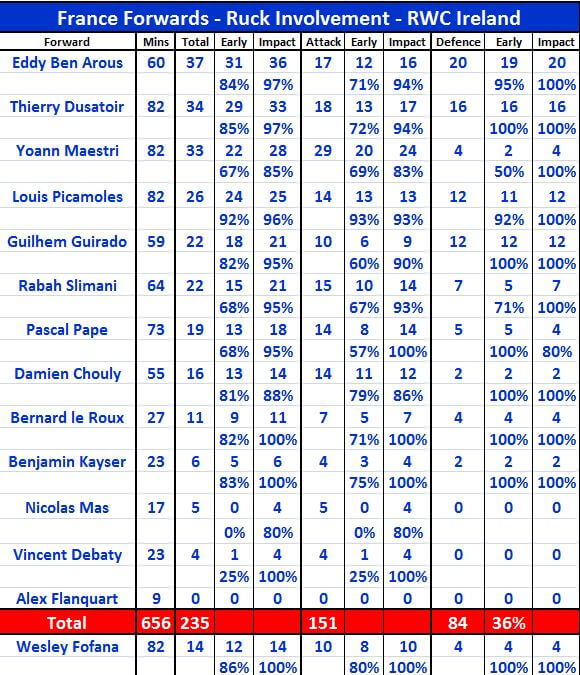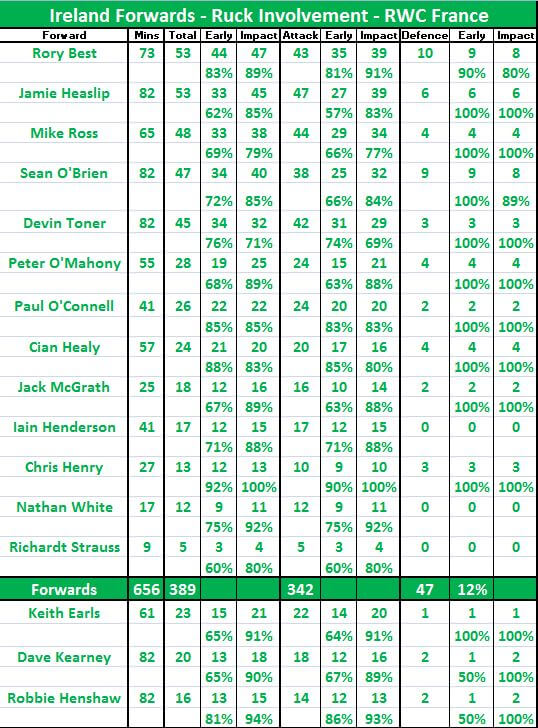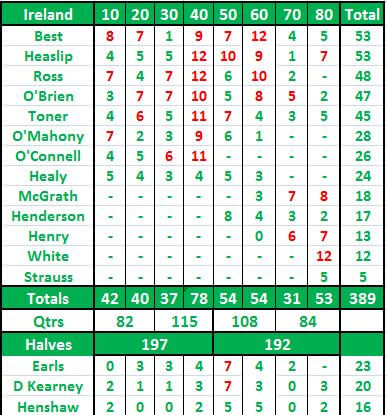Scheduled Website Maintenance
We’re currently in the process of moving to a new and improved server environment. During this transition, the website may experience brief interruptions or temporary outages.
We appreciate your patience while we complete this upgrade. Service will return to normal shortly, with improved performance and reliability.
Thank you for your understanding.
Another “hard day in the office”.
This crucial Pool D clash was a compelling game to watch as the winner benefited from switching away from the All Blacks and Springboks side of the draw for the next couple of weeks.
Both teams had scored about the same number of tries in their 3 pool games with relatively easy wins against Romania and Canada and tighter struggles against Italy.
Any early expectations of seeing the French attacking flair being unleashed was dashed right from the start by strong defensive pressure from Ireland. Up until the main break, France struggled to get out of their half. For 80 minutes they never threated to breach Ireland’s try line.
Ireland dominated Possession (69%) and Territory (72%) – particularly in the 2nd half (P 76%/T 80%).
Ireland’s running game was superior to France with 172 carries for 423m v 90 carries for 268m.
France’s defence was under pressure the entire match which resulted in double the number of Turn Overs Conceded (France 17:8 Ireland).
Both teams applied strong, effective tackles – France 197 tackles/23 missed (90%) and Ireland 99 tackles11 missed (90%). France was particularly switched on as shown by the likely RWC ending injuries to Sexton, O’Connell and O’Mahony. 10 of France’s starting XV made >10 tackles with some impressive numbers at the top of the list: Picamoles and Dusatoir 21/1; Parra 17/1; Maestri 17/3. Substitute Back Rower, le Roux made 9/0 in just 27 minutes. By comparison only Heaslip (11/1) made double figures for Ireland.
Ireland won 146 of 152 rucks (96%) and France 62 of 67 (92%). Turn Overs Won by Forwards were France 6:7 Ireland; with top exponents O’Brien 3, O’Mahony 2 and Dusatoir 2.
RUCK INVOLVEMENTS
Remember:
- Early means 1st or 2nd of player’s team AFTER the ball carrier has been tackled and brought to ground.
- Impact means active engagement: strong physical contact, changed shape of ruck, clean-out, protecting ball etc. (more than hand on someone’s bum or arriving after the hard work has been done). Yes it’s subjective – but as I collect all data at least it’s consistent.
- Impact DOES NOT equate to Effectiveness. I’ve concluded that coming up with an effectiveness measure is just too hard in the time that I have available – but open to suggestions.
Comments:
- The intensity that both teams brought to the breakdown is shown by the relatively high “impact” figures.
- The Front Rows led the way for Ruck Involvements for both teams. French Prop, Ben Arous and Irish Hooker, Best, provided most muscle on the opposition’s ball carriers.
- France Forwards were very involved in putting pressure on the France ball carriers with Defensive Rucks being 36% of Total Rucks by Forwards.
- Ireland Forwards were more selective in standing off most Defensive Rucks. Defensive Ruck Involvements were only 12% of Total Rucks by Forwards.
- The Backs of both teams contributes about 20% of team Total Ruck Involvements.
- The work rate/Total Ruck Involvement and commitment shown by Best, Heaslip, Ross, O’Brien and Toner presents a formidable challenge for any opposition. Best and Heaslip gave the highest numbers I’ve collected in more than a year. Before his injury, O’Connell was matching this work rate. Toner makes a lot of rucks but generally with low impact.
- Ireland will certainly miss O’Brien’s rucking efforts in the game against Argentina. O’Connell and O’Mahony’s efforts will be sorely missed in games ahead.
- Replacement Flanker, le Roux, put in a strong rucking effort during his 27 mins.
Comments:
- In much the same manner as Wales against the Wallabies, Ireland put France under immense pressure from the opening whistle with nearly double the ruck involvements in the first 20 minutes.
- France lost a lot of momentum by missing 2 Penalty Goals during this period.
- During the 2nd Qtr, Ireland continued to take all of its scoring opportunities while stifling any France attacks. The rucking efforts by the Ireland Forward pack in the 10 minutes leading up to half time must have resulted in a very grim France change room at the main break.
- While France reduced its ruck pressure in the 2nd half (~20%), Ireland maintained the same ruck involvements at a rate which was approx. double that of France. The Ireland Backs’ work rate certainly lifter after half time.
- It was a command defensive effort by Ireland as France had to toil for >40 minutes to get their 3rd and final Penalty Goal. France never really challenged the Ireland try line.
- Ireland was well served by the replacement Forwards who all made strong contributions as the 80-minute players were tiring.
Implications for the RWC Finals:
- At past RWCs, France has shown that the result depends upon which team actually turns upon the day.
- Although it was still strong defensive effort by France they showed little of their attacking flair.
- Some of the tackle hits by France were as aggressive/effective as we’ve seen in matches to date.
- It will certainly be a tragedy for Ireland and the tournament if that was the last we see of Sexton, O’Connell and O’Mahony in RWC 2015.
- Ireland has shown that they are capable of a work rate at the rucking interface that has yet to be matched by any other team. The 389 Total Ruck involvements were 65% more than France.
- Although I haven’t collect data from all matches, this rucking effort is streets above those teams still in the running. It was:
- 25% above Wale’s best (305) against Wallabies;
- 45% above the Wallabies’ best (267) against Wales; and
- 50% above the ABs’ best (260) against Pumas.
- Every team can only play to the opposition. However, only Ireland has shown that this work rate and level of ruck involvement can be maintained for 80 minutes.
- The Front Rows contributed 41% of the Total Ruck Involvements by Forwards for both teams.
- All 3 France Front Rowers were in the top 6 of their team for Ruck Involvements with Prop (Ben Arous) at the top of the list.
- Two of the Ireland Front Rowers were in their team’s top 3 for Ruck Involvement, with Hooker (Best) at the top of the list.
- The Wallaby Front Rowers are generally in the lower half of the Ruck Involvements by Forwards. Kepu in his 55 minutes usually has fewer ruck involvements than Forwards off the bench. The best efforts by Wallaby Front Rowers in RWC to date have been:
- Fiji – Moore , No5 on table with 30% Ruck Involvements of Pocock;
- Uruguay – TPN, No4 on table with 50% RIs of McMahon;
- England – Moore, No 5 on table with 74% RIs of Pocock; and
- Wales – Sio, No 6 with 44% RIs of Fardy.
- The Ruck Involvements by our Locks is generally comparable to those of other top-tier teams.
IMO the Wallabies face the prospect of being outmuscled by top tier teams which show a more even workload in Ruck Involvements across the Forward Pack. The Wallabies best was 34% against England but is normally at 27%-31%. This potentially exposes our ball carriers and places a huge workload on the Wallaby Back Row – particularly at Defensive Rucks.





